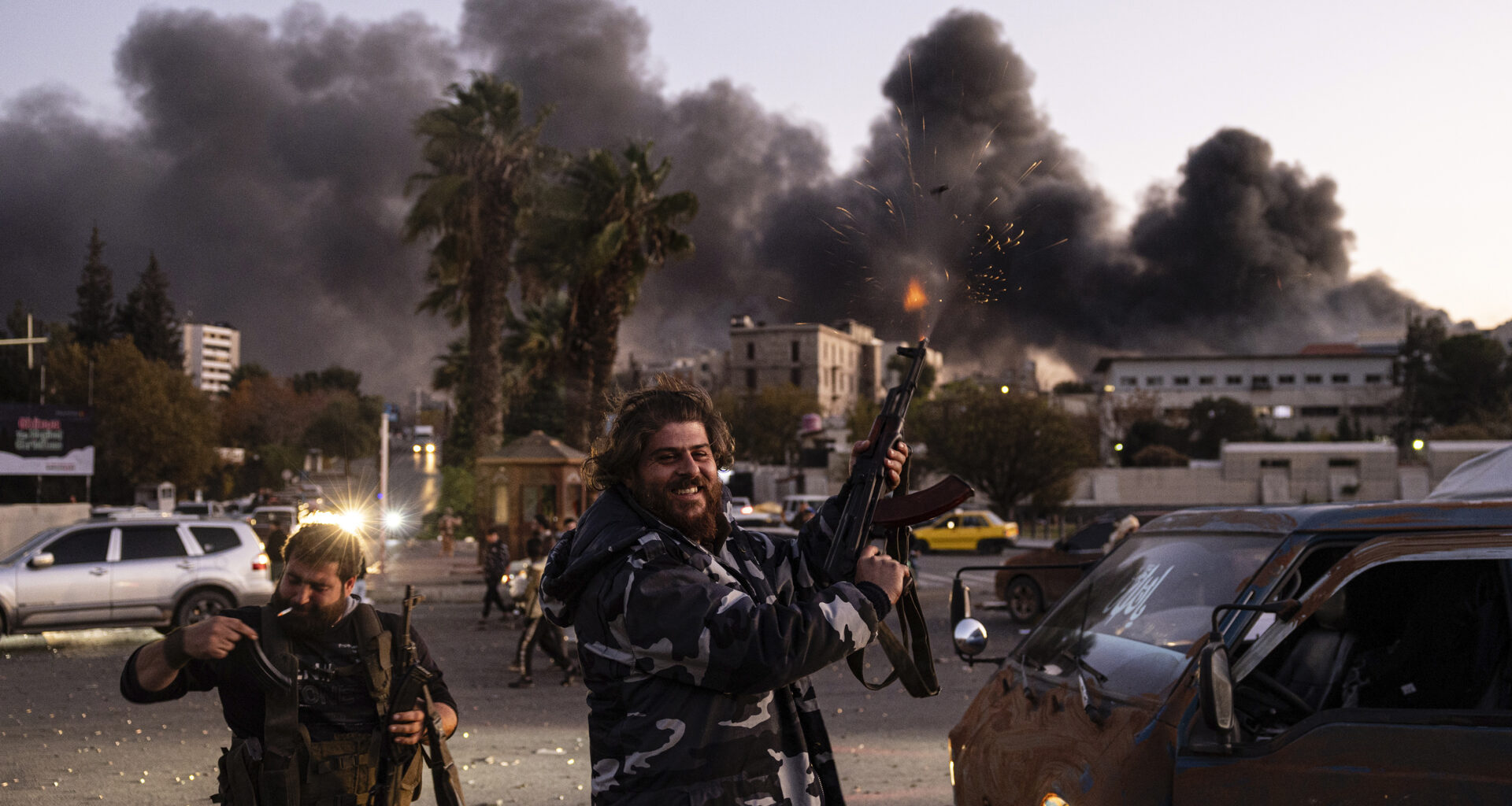Germany and Austria have suspended asylum applications from Syrian citizens, citing the uncertainty surrounding political developments following the overthrow of Bashar al-Assad’s regime. The move comes as both countries reassess the situation in Syria, with both governments halting all new asylum claims and pausing the processing of pending requests, The Telegraph reported. In Germany, which has been one of the largest recipients of Syrian refugees in Europe, more than 72,000 Syrians applied for asylum this year alone, and over 47,000 applications remain unresolved. Austria has followed suit, freezing Syrian asylum applications and preparing for the deportation of Syrians already living in the country. The Austrian government, under Chancellor Karl Nehammer, said on Monday that all ongoing asylum requests from Syrians would be suspended, per the publication. Nehammer instructed the country’s interior ministry to review past asylum decisions and develop a plan for the repatriation of Syrians. The Austrian interior minister, Gerhard Karner, further emphasized that family reunification for Syrians in Austria would also be halted. Germany has taken in nearly one million Syrians, with many arriving during the height of the refugee crisis in 2015 and 2016 under then-Chancellor Angela Merkel. This made Syria the largest source of asylum seekers in Germany. In Austria, around 100,000 Syrians currently live in the country, one of the largest diaspora communities in Europe.
Follow Newsweek’s live blog for the latest updates.
12:12 PM EST
Syrian Parliament: ‘We support the will of the people to build a new Syria’
Syria’s parliament issued a historic statement, expressing its support for the will of the people to build a new country, following a dramatic shift in the nation’s political landscape. The declaration came just one day after President Bashar al-Assad fled Damascus, as rebel forces successfully took control of the capital.
“December 8th was a historic day in the lives of all Syrians. We support the will of the people to build a new Syria towards a better future governed by law and justice,” the Syrian Parliament shared in a statement.
11:59 AM EST
OPINION: Who are the winners and losers in the fall of Syria’s Assad?
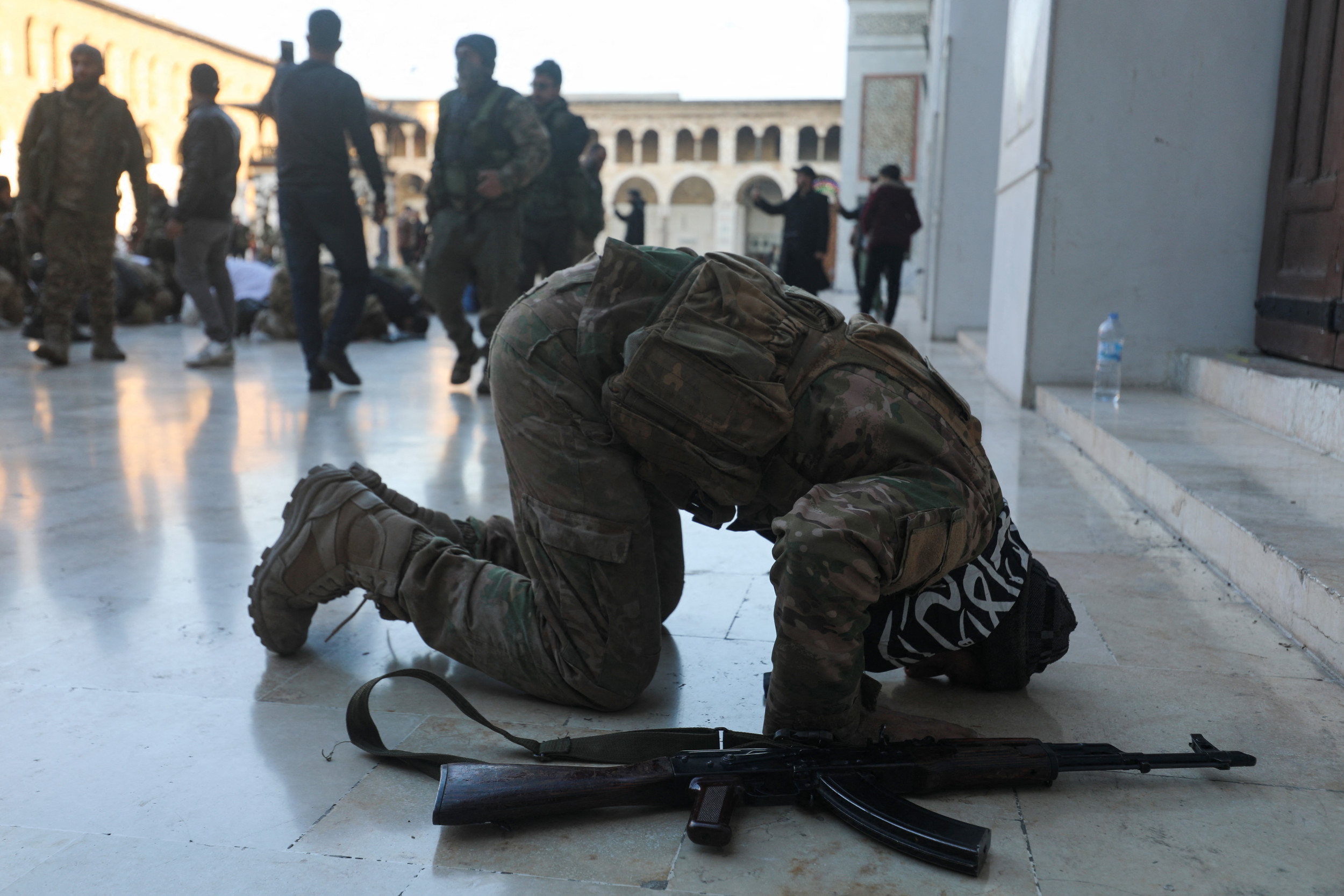
An anti-government fighter prays in the courtyard of Damascus’ historic Umayyad mosque on Dec. 8.
An anti-government fighter prays in the courtyard of Damascus’ historic Umayyad mosque on Dec. 8.
ABDULAZIZ KETAZ/AFP via Getty Images)
In 2016, I broke a Ramadan fast with a group of Syrian ex-rebel fighters in the Turkish town of Kilis, three miles from the Syrian border. We shared dates, erksous—a bittersweet drink made of licorice root—copious amounts of food and hookahs, while they told me their war stories and described the brutality of the regime. They were outraged by the government’s atrocities, including makeshift barrel bombs dropped on their hometowns, sarin gas deployed against civilians, and the horrible torture techniques employed by the Mukhabarat, Bashar Al-Assad‘s feared intelligence agency.
A fighter nicknamed “the Cat,” because had—so far—survived being shot eight times, told me he’d lost all hope of victory. Indeed, with ISIS flags waving just across the border, rebel forces in shambles and the Bashar al-Assad regime bolstered by Iran and Russia, Syria’s future seemed bleak.
Yet over the weekend, suddenly, and to much of the world’s surprise, the despotic regime of the al-Assad family fell and Assad himself, with his wife and children, escaped to Moscow, where he was granted political asylum.
Read the full opinion article by analyst Joseph Epstein on Newsweek.
11:50 AM EST
Remarks by President Biden regarding Syria in full
The following are U.S. President Joe Biden’s remarks about the latest in Syria:
Good afternoon. A lot happening in the Middle East.
After 13 years of civil war in Syria and more than half a century of brutal authoritarian rule by Bashar Assad and his father before him, rebel forces have forced Assad to resign his office and flee the country. We’re not sure where he is, but the- — there’s word that he’s in Moscow.
At long last, the Assad regime has fallen. This regime brutalized and tortured and killed literally hundreds of thousands of innocent Syrians.
A fall of the regime is a fundamental act of justice. It’s a moment of historic opportunity for the long-suffering people of Syria to build a better future for their proud country.
It’s also a moment of risk and uncertainty. As we all turn to the question of what comes next, the United States will work with our partners and the stakeholders in Syria to help them seize an opportunity to manage the risks.
You know, for years, the main backers of Assad have been Iran, Hezbollah, and Russia. But over the last week, their support collapsed — all three of them — because all three of them are far weaker today than they were when I took office. And let’s remember why.
After Hamas attacked Israel on October the 7th, 2023, when much of the world responded with horror, Iran and its proxies chose to launch a multi-front war against Israel. That was a historic mistake on Iran’s part.
Today, Iran’s main territorial proxy, Hezbollah, is also on its back.
Only 12 days ago, I spoke from the Rose Garden about the ceasefire deal in Lebanon — a deal that was only possible because Hezbollah has been badly degraded. Meanwhile, Hamas has been da- — badly degraded as well.
Iran’s own military capabilities have been weakened. Iran tried two times to attack Israel, and the United States and — built a coalition of countries to directly defend Israel and help defeat those attacks.
All this made possible for Iran and Hezbollah to continue to prop up — impossible, I should say, for them to prop up the Assad regime.
Additionally, Russia’s support for Assad also failed. And that’s because Ukraine, backed by our American allies, has put up a wall of resistance against the invading Russian forces, inflicting massive damage on the Russian forces. And that has left Russia unable to protect its main ally in the Middle East.
(Coughs.) Excuse my cold.
The upshot for all this is, for the first time ever, neither Russia nor Iran nor Hezbollah could defend this abhorrent regime in Syria. And this is a direct result of the blows that Ukraine, Israel have delivered upon their own self-defense with unflagging support of the United States.
And over the past four years, my administration pursued a clear, principled policy towards Syria.
First, we made clear from the start sanctions on Ira- — on Ira- — Assad would remain in place unless he engaged seriously in a political process to end the civil war, as outlined under the U.N. Security Council resolution passed in 2015. But Assad refused, so we carried out a comprehensive sanction program against him and all those responsible for atrocities against the Syrian people.
Second, we maintained our military presence in Syria. Our counter-ISIS — to counter the support of local partners as well on the ground — their partners — never ceding an inch of territory, taking out leaders of ISIS, ensuring that ISIS can never establish a safe haven there again.
Third, we’ve supported Israel’s freedom of action against Iranian networks in Syria and against actors aligned with Iran who transported lethal aid to Lebanon, and, when necessary, ordered the use of military force against Iranian networks to protect U.S. forces.
Our approach has shifted the balance of power in the Middle East. Through this combination of support for our partners, sanctions, and diplomacy and targeted military force when necessary, we now see new opportunities opening up for the people of Syria and for the entire region.
Looking ahead, the United States will do the following: First, we’ll support Syria’s neighbors — including Jordan, Lebanon, Iraq, and Israel — should any threat arise from Syria during this period of transition. I will speak with leaders of the region in the coming days. I had long discussions with all of our people earlier this morning. And I’ll send senior officials from my administration to the region as well.
Second, we will help stability — ensure stability in eastern Syria, protecting any personnel — our personnel against any threats. And it will remain — our mission against ISIS will be maintained, including the security of detention facilities where ISIS fighters are being held as prisoners. We’re clear-eyed about the fact that ISIS will try to take advantage of any vacuum to reestablish its capability and to create a safe haven. We will not let that happen.
In fact, just today, U.S. forces conducted a dozen of precision strikes — air strikes within Syria targeting ISIS camps and ISIS operatives.
Third, we will engage with all Syrian groups, including within the process led by the United Nations, to establish a transition away from the Assad regime toward independent, sovereign — an independent — independent — I want to say it again — sovereign Syria with a new constitution, a new government that serves all Syrians. And this process will be determined by the Syrian people themselves.
And the United States will do whatever we can to support them, including through humanitarian relief, to help restore Syria after more than a decade of war and generations of brutality by the Assad family.
And finally, we will remain vigilant. Make no mistake, some of the rebel groups that took down Assad have their own grim record of terrorism and humanit- — human right abuses. We’ve taken note of statements by the leaders of these rebel groups in recent days. And we’re — they’re saying the right things now, but as they take on greater responsibility, we will assess not just their words, but their actions.
And as — we are mindful — we are mindful that there are Americans in Syria, including those who reside there, as well as Austin Tice, who was taken captive more than 12 years ago. We remain committed to returning him to his family.
As I’ve said, this is a moment of considerable risk and uncertainty, but I also believe this is the best opportunity in generations for Syrians to forge their own future free of opposition.
It’s also an opportunity, through far from certain — though it’s far from certain, for a more secure and prosperous Middle East, where our friends are safe, where our enemies are contained. And it would be a waste of this historic opportunity if one tyrant were toppled and only a — only to see a new one rise up in its place. So, it’s now incumbent upon all the opposition groups who seek a role in governing Syria to demonstrate their commitment to the rights of all Syrians, the rule of law, and the protection of religious and ethnic minorities.
These past few days have been historic, and, you know, it’s in the days ahead that will determine the future of a — this country, and we intend to approach them with strength, wisdom, and resolve.
So, thank you very much. God bless America. And God protect our troops.
Thank you.
11:36 AM EST
Oil prices surge as Syrian leader Bashar al-Assad ousted from power
Global oil prices rose Monday following the ousting of President Bashar al-Assad’s 50-year family rule over Syria.
The upheaval in Damascus has intensified uncertainty about energy supplies in the Middle East.
U.S. benchmark crude oil increased by 75 cents to $67.95 per barrel, while Brent crude, the international standard, rose 69 cents to $71.81 per barrel.
Although Syria is not itself a major oil producer, its strategic location has the potential to cause disruption to key oil stakeholders including Iraq, Iran, Saudi Arabia, and Turkey.
Further escalation in the Middle East could disrupt key oil production facilities or transportation routes, such as the Strait of Hormuz, a channel for nearly one-sixth of global oil supply.
11:27 AM EST
Syrian opposition flag raised at Moscow embassy as Bashar al-Assad is granted asylum
A group of men hoisted the opposition flag at the Syrian embassy in Moscow, just one day after the fall of Bashar al-Assad’s government in Damascus.
When the regime collapsed on Sunday, thousands of Syrians flooded the streets, celebrating with gunfire and waving revolutionary flags.
The scene mirrored the early moments of the Arab Spring uprising, before the violent suppression and the emergence of armed resistance led to the country’s descent into civil war.
11:24 AM EST
New Syria rulers declare amnesty for conscripted soldiers
The new leaders of Syria have declared an amnesty for all soldiers who were conscripted into the Assad military.
The Military Operations Command announced the general amnesty Monday, saying the conscripted troops are, “granted safety for their lives, and any harm against them is strictly prohibited.”
The amnesty does not apply to anyone who voluntarily signed up to fight for Assad.
11:13 AM EST
Why Putin is the biggest loser of Assad’s downfall in Syria
Vladimir Putin has been dealt a significant geopolitical blow with the downfall of Bashar al-Assad, whose regime in Syria the Russian president had committed considerable funding and military resources to propping up.
Assad fled Syria and has claimed political asylum in Russia, Kremlin-backed media reported, his now exiled status depriving Moscow of a key regional ally.
Russia’s military assets in Syria are now under threat, such as its naval base in the port city of Tartus, which gave the Kremlin a presence near NATO‘s southern flank in the Mediterranean Sea.
“This was their foothold in the Mediterranean, and from there out into the Atlantic—it will be a big blow to lose that,” Edward Lucas, senior fellow at the Center for European Policy Analysis (CPA) told Newsweek.
10:59 AM EST
What happened in Syria, and who has taken control of the country?

People wave guns in the air, as they gather to celebrate the fall of the Syrian regime in Umayyad Square on December 8, 2024 in Damascus, Syria. Russian soldiers are reportedly fleeing Syria, with new…
People wave guns in the air, as they gather to celebrate the fall of the Syrian regime in Umayyad Square on December 8, 2024 in Damascus, Syria. Russian soldiers are reportedly fleeing Syria, with new footage emerging that shows military personnel speeding away from an airbase.
More
Ali Haj Suleiman/Getty
The Syrian government has been toppled, and its leader sent into exile, a seismic shift poised to reshape the balance of power in the Middle East.
Rebels seized the capital Damascus over the weekend, having captured Homs and other smaller cities in a lightning-fast offensive that took the incumbent government by storm.
Civilians across Syria have taken to the streets to celebrate the fall of the family regime, which has governed the nation since the 1960s, and whose repressive policies helped instigate the 2011 uprising that plunged the country into civil war.
Bashar al-Assad, who has governed since the death of his father Hafez in 2000, has fled to Russia, where he and his family have been granted political asylum by the government under the orders of President Vladimir Putin.
Any domestic political instability within Syria carries with it significant ripple effects on the global stage, as demonstrated by the 2011 uprising, and the subsequent civil war which triggered a massive refugee crisis for Europe and enabled the spread of ISIS. Its borders with Israel and Lebanon, as well as Iraq, Jordan and Turkey, mean any unrest could quickly spread to the rest of the region, already fraught with unrest.
Syria’s political future therefore carries global significance, and all eyes will be watching as its new leaders seek to control the fractious country, navigate its complex alliances, and rebuild a nation scarred by years of conflict and division.
10:50 AM EST
U.S. designates Fawaz al-Akhras for supporting Bashar al-Assad
The U.S. government has designated Fawaz al-Akhras under Executive Order 13894 for materially assisting, sponsoring, or providing financial, material, or technological support to Syrian President Bashar al-Assad. Al-Akhras is accused of supporting Assad’s efforts in financial matters, sanctions evasion, and attempts to gain international political recognition, the U.S. Treasury department shared in a release.
Al-Akhras’ actions are linked to Assad’s regime, which the U.S. first sanctioned in 2011 under Executive Order 13572 for serious human rights abuses. In 2020, the U.S. expanded the sanctions under E.O. 13894, citing Assad’s obstruction of ceasefire efforts and a political resolution to the ongoing Syrian conflict.
According to the U.S. Department of State and non-governmental organizations, Assad’s government has been responsible for widespread human rights violations, including extrajudicial killings, torture, sexual violence, and the arbitrary arrest of political dissidents. Additionally, the regime has been accused of denying detainees fair trials, disrupting humanitarian access, and repressing political activists abroad.
10:43 AM EST
People in Berlin celebrate idea of returning home to Syria
Massive celebrations across Europe, these are the scenes in Berlin as hundred of thousands of people can now return home from Syria. Assad made at least 12 million into refugees worldwide.
The reduction of refugees will also declaw the far-right movement since it removes many… pic.twitter.com/w8f6BZoCMX
— Anonymous (@YourAnonCentral) December 8, 2024
Hundreds of thousands of people are returning to their homes in Syria, sparking massive celebrations across Europe. In Berlin, jubilant crowds gathered to mark the milestone, as many refugees are now able to return after years of displacement, as seen in a video posted on X yesterday.
The reduction in refugee numbers is expected to weaken far-right movements in Europe, which have often used anti-refugee rhetoric to fuel their agendas. These groups portrayed refugees as a threat, capitalizing on fears to stir division.
10:34 AM EST
Sweden also halting Syrian asylum rulings
Following the overthrow of al-Assad, it appears that more nations are considering suspending Syrian refugee claims. According to AFP, the Swedish Migration Agency has announced a delay in judgments on Syrian asylum petitions and deportations, citing recent changes in the country.
“Given the situation, it is simply not possible to assess the grounds for protection at this time,” head of legal affairs at the agency Carl Bexelius said in a statement cited by the news agency, and added that the formal ruling is due tomorrow, it said.
10:13 AM EST
Joe Biden warns Syrian rebel groups after Assad’s fall
President Joe Biden issued a warning to the rebel groups that toppled the decades-long Assad regime, insisting the United States would help ensure “stability” in the wake of the government’s collapse.
Syrian President Bashar al-Assad fled the country as rebel forces moved into the capital city Damascus overnight Saturday, with reports that he found safe haven in Russia as his government crumbled in a matter of hours, ending a 50-year regime.
Biden, speaking Sunday from the Roosevelt Room in the White House, praised the effect of Israel’s campaign against Hezbollah, a Lebanese militant group, and Ukraine’s staunch defense against Russia’s invasion as major factors that allowed rebel forces to take back Syria and topple Assad.
10:01 AM EST
UK Prime Minister comments on events in Syria
Prime Minister of the United Kingdom Keir Starmer has commented on the events in Syria, sharing his statement to X.
“The Syrian people have suffered under Assad’s barbaric regime for too long and we welcome his departure,” he wrote in part in his statement yesterday.
09:51 AM EST
Justin Trudeau’s social media statement about Syria
Canadian Prime Minister Justin Trudeau shared comments on social media, speaking to the situation in Syria.
He said, “Canada is monitoring this transition closely. We urge order, stability, and respect for human rights.”
The fall of Assad’s dictatorship ends decades of brutal oppression. A new chapter for Syria can begin here — one free of terrorism and suffering for the Syrian people.
Canada is monitoring this transition closely. We urge order, stability, and respect for human rights.
— Justin Trudeau (@JustinTrudeau) December 8, 2024
09:28 AM EST
Viral video shares luxury cars appearing to belong to al-Assad
A viral video shared on social media yesterday depicts dozens of luxurious cars, stored in a garage in western Damascus, near the Syrian capital’s Presidential Palace, reportedly belonging to Bashar al-Assad.
09:11 AM EST
Jake Sullivan speaks about Syria in TV appearance
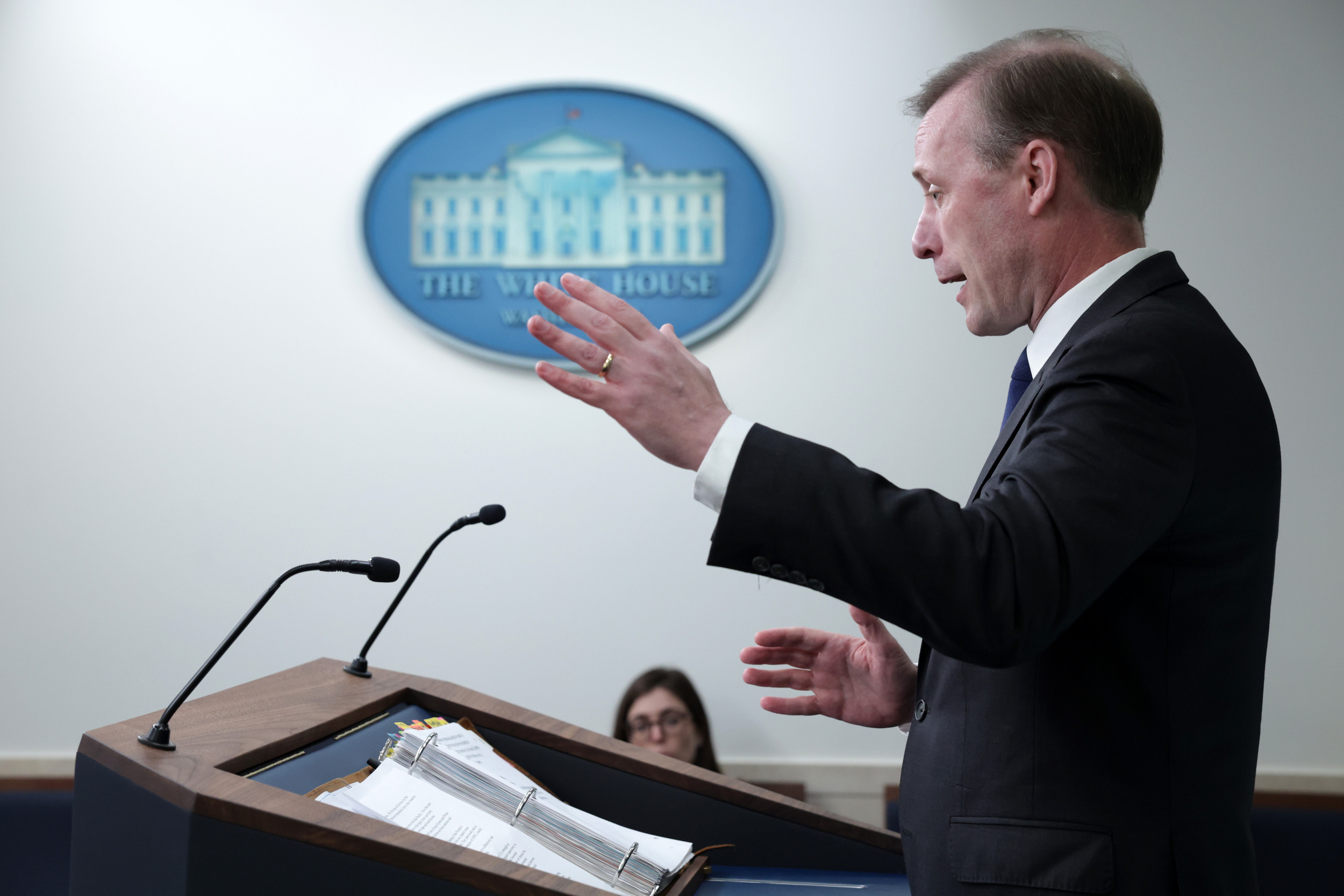
National Security Adviser Jake Sullivan speaks during a daily news briefing at the James S. Brady Press Briefing Room of the White House on November 13, 2024 in Washington, DC. Sullivan discussed President Biden’s trip…
National Security Adviser Jake Sullivan speaks during a daily news briefing at the James S. Brady Press Briefing Room of the White House on November 13, 2024 in Washington, DC. Sullivan discussed President Biden’s trip to Peru and Brazil. Sullivan said that the U.S. is going to work with Syrian groups.
More
Alex Wong/Getty Images
White House National Security Adviser Jake Sullivan addressed the evolving situation in Syria following the potential downfall of Bashar al-Assad’s regime on Monday in an appearance on CBS This Morning. He noted that major Syrian rebel groups, including some previously labeled by the U.S. as terrorist organizations, have been expressing positive and constructive intentions.
Sullivan said that these groups have been saying “all the right things” in light of the uncertainty surrounding Syria’s future, adding that the U.S. will continue to engage with all Syrian factions, noting President Biden’s remarks on their potential to contribute to a better future for Syria.
However, Sullivan stressed that the key challenge now lies in determining how these groups will act to bring about meaningful change in the country.
“We’re going to work with all the groups in Syria, and as President Biden said yesterday, the rebel groups, including the ones that have been designated as terrorist groups, have actually said all the right things,” Sullivan said. “Now the question is, what will they do to try to bring about a better Syria.”
09:05 AM EST
The 1600 newsletter: Trump’s Syria message to Putin
The 1600 newsletter author Carlo Versano writes this morning about the lightning offensive that toppled Assad’s regime in Syria marked a major shift, with rebels swiftly seizing Damascus and forcing Assad into exile in Russia:
Well, I suppose you could say the anti-incumbency wave sweeping the world made it to the Middle East over the weekend with the lightning offensive that deposed the Assad regime in Syria. US intelligence officials are said to be shocked at how quickly and bloodlessly rebels took Damascus, sending Assad to exile in Russia after a brutal 13 year civil war.
There is perhaps some irony in this all coming on the precipice of Trump’s return to the White House, given his pick for intelligence chief, Tulsi Gabbard, had traveled to Syria to meet with Assad after he gassed his own people and has been seen as somewhat more sympathetic to Assad and his handlers in Russia than the DC consensus.
But brass tacks on Syria: this is arguably a good geopolitical development for Trump and the US. Assad’s fall is an embarrassment to both Moscow and Tehran, the latter of which is increasingly exposed as a paper tiger with the degradation of Hezbollah and Hamas.
HTS, the rebel group that finally toppled the 50-year Assad dictatorship, is technically a designated terrorist group with roots in al Qaeda, but it’s also probably the least bad option to take power in Syria. HTS’ leader has even said he has no beef with the West anymore and practices a kindler, gentler form of Islamic fundamentalism that embraces pluralism and tolerance.
Of course, this is the Middle East we’re talking about so things could go sideways in a hurry.
What feels more certain, though, is that the region is clearly showing the early signs of major, tectonic changes that are going to play out under a Trump administration. And we don’t really know what a Trump 2.0 foreign policy is going to look like beyond his pledge to refrain from the US entangling itself in new wars. But developments in the Middle East have a tendency to scramble the plans of new presidents.
Ask George W. Bush, who ran for president in 2000 on an explicit promise to refrain from “nation-building” in the region.
08:51 AM EST
OPINION: Syria’s Assad falls: Could Iran be next?
On Sunday morning, a lightning offensive by Syrian rebels ended with the dramatic fall of Damascus, marking the collapse of Bashar al-Assad‘s regime after 13 years of devastating civil war. One of the most consequential moments in the Middle East’s recent history was set in motion by a chain of events that few could have anticipated, least of all Hamas and Israel, whose war inadvertently played a pivotal role. Now comes the tough part, where the Middle East either gets better, or even worse.
The fall of Assad is a stark reminder of how unintended consequences shape history. Israel and the West were long ambivalent about Assad’s fate. He is a butcher who used chemical weapons against his own people and led to the deaths of hundreds of thousands, yet his control over Syria offered predictability, even tacit stability, in a volatile region.
And critically, the coalition arrayed against him seemed dominated by Islamists – and, let’s face it, the West has hated political Islam ever since the mullahs of Iran engineered the US hostage crisis 45 years ago. This is, at the end of the day, Samuel Huntington’s “Clash of Civilizations.” It’s real.
08:39 AM EST
IN PICTURES: Lebanese border sees surge in arrivals amidst Syrian political upheaval
Many travelers, primarily Syrians, arrived at the Masnaa border crossing into Lebanon. The Lebanese security forces were deployed to manage the growing crowd, as people made their way through the border in the wake of a dramatic shift in Syria’s political landscape.
The influx comes just one day after a lightning offensive by Islamist-led rebel forces resulted in the fall of Damascus, the Syrian capital. On December 8, 2024, these rebels successfully ousted President Bashar al-Assad, effectively ending over five decades of Baathist rule in Syria. This unexpected turn of events has caused widespread uncertainty, prompting many Syrians to seek refuge in neighboring Lebanon.
At the border, travelers waited for processing, their futures uncertain as they looked for safety in Lebanon. The scene at Masnaa reflected the gravity of the situation unfolding in Syria, with thousands of people now facing a new chapter of displacement amid the country’s sudden transformation.
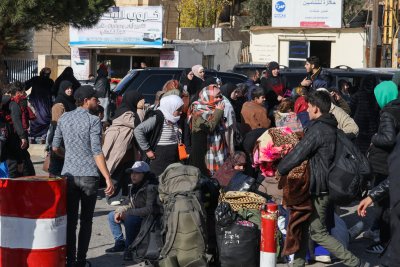
Lebanese security forces deploy to organise the crowd as people, mostly Syrians, arrive from their country to the Masnaa border crossing on the way to Lebanon on December 9, 2024. Islamist-led rebels took Damascus in a lightning offensive on December 8, ousting president Bashar al-Assad and ending five decades of Baath rule in Syria.
Anwar Amro/Getty Images
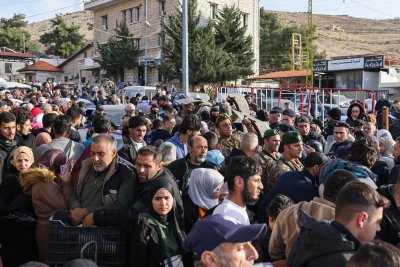
Travelers from Syria await processing at the Lebanese Masnaa border crossing on their way to Lebanon on December 9, 2024. Islamist-led rebels took Damascus in a lightning offensive on December 8, ousting president Bashar al-Assad and ending five decades of Baath rule in Syria.
Anwar Amro/Getty Images
08:25 AM EST
U.S. closely monitoring Syria’s chemical weapons after Assad ouster
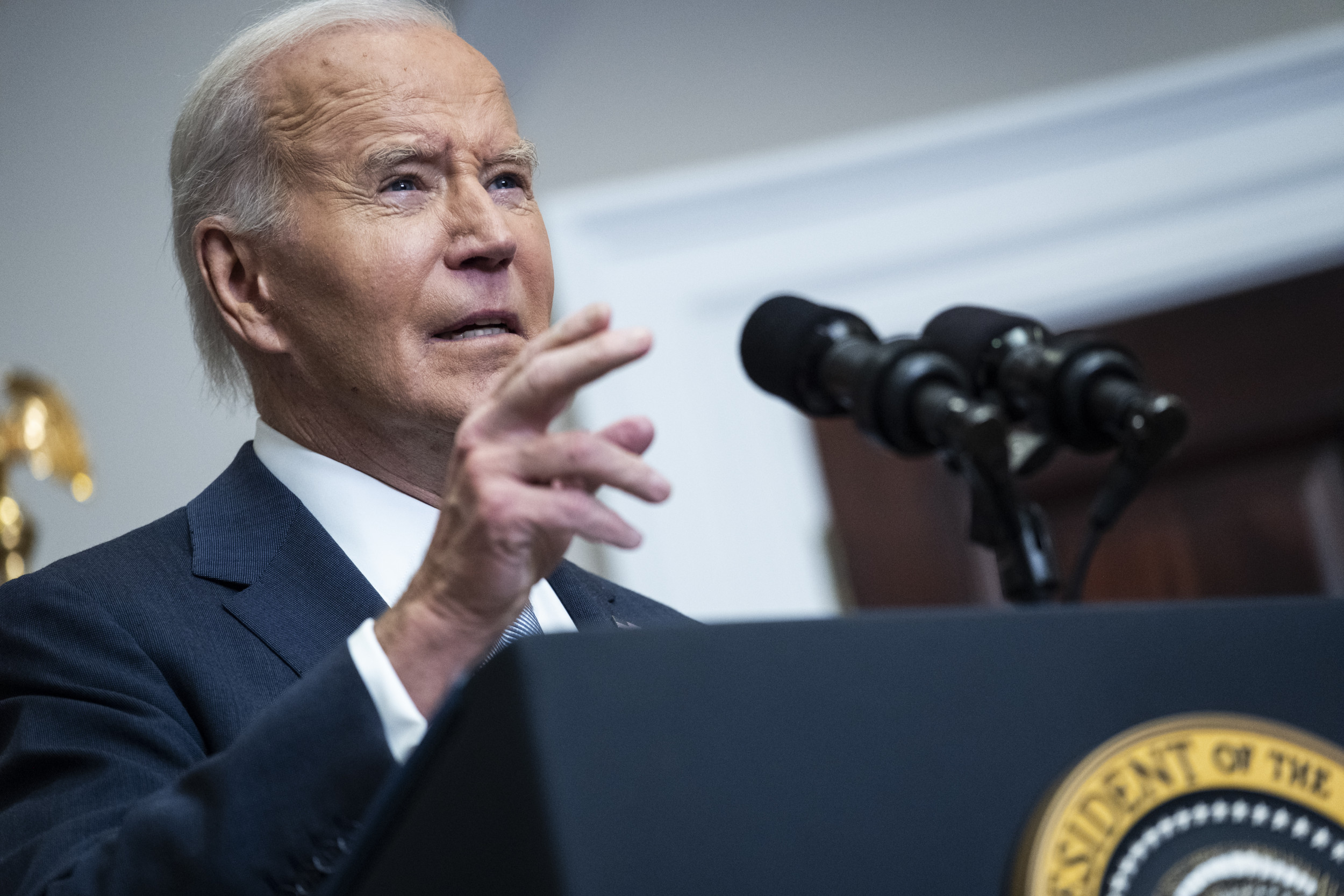
Above, President Joe Biden delivers remarks on the latest developments in Syria from the White House on December 8 in Washington, D.C. Syrian rebel fighters toppled the regime of Bashar Al-Assad this weekend, raising concerns…
Above, President Joe Biden delivers remarks on the latest developments in Syria from the White House on December 8 in Washington, D.C. Syrian rebel fighters toppled the regime of Bashar Al-Assad this weekend, raising concerns about what will happen to Syria’s chemical weapons stockpiles.
More
Pete Marovich/Getty Images
The United States is closely monitoring Syria’s chemical weapons stockpile following the rapid fall of the Assad regime and views the issue as a “top-tier” priority in the region, according to a senior Biden administration official.
The U.S. is focused on ensuring that Syria’s chemical weapons don’t fall into the wrong hands after the collapse over the weekend of Syrian President Bashar al Assad’s decades-long rule, the official said.
“We are doing everything we can to prudently ensure that those materials are either not available to anyone or are cared for,” the official said Sunday, speaking in the background to brief reporters on the latest developments in Syria.
National security experts are “fairly confident” that Syria’s chemical weapons stockpile can be “destroyed” or secured, the official added.
The senior administration official did not provide further details but said the Biden administration isn’t planning to send U.S. troops into Syria to secure or destroy chemical weapons held by the former Assad regime.
08:14 AM EST
Syria Central Bank is still operational
In a statement released on Facebook, the Central Bank of Syria has confirmed that it is still operational.
It added in the post that the funds and deposits of those who bank with it are safe.
08:01 AM EST
EU Commission president speaks with King of Jordan
Good phone call with my friend @KingAbdullahII
We discussed the implications of the collapse of the Assad regime for Syria and the region.
For us, Syria’s territorial integrity and protection of minorities are critical.
We’ll stay in close contact given the volatile…
— Ursula von der Leyen (@vonderleyen) December 9, 2024
EU Commission President Ursula von der Leyen shared on X that she spoke with King of Jordan Abdullah II to discuss “the implications of the collapse of the Assad regime for Syria and the region.”
von der Leyen promised to speak with other leaders between today and the rest of the week.
07:50 AM EST
Syrian PM working towards ‘quick and smooth’ transition of power
Syrian Prime Minister Mohammed Ghazi Jalali emphasized the government’s efforts to ensure a smooth transition of power during the country’s ongoing political changes. Speaking to Sky News Arabia on Monday, Jalali said that most of the cabinet members in Damascus are focused on facilitating a quick and seamless shift of authority.
“We are working so that the transitional period is quick and smooth,” he stressed.
In his remarks, Jalali also expressed his willingness to engage in dialogue with Ahmad al-Sharaa, the leader of the insurgent group Hayat Tahrir al-Sham. His openness to meeting with the head of the group highlights the government’s intention to explore possible negotiations and address the broader complexities of Syria’s conflict.
07:34 AM EST
Biden shares tweet about Assad’s fall
U.S. President Joe Biden has shared a tweet regarding the fall of Assad.
“It is a moment of historic opportunity for the long-suffering people of Syria to build a better future for their country,” he wrote. “It is also a moment of risk and uncertainty.
At long last, the Assad regime has fallen.
The fall of this regime is a fundamental act of justice.
It is a moment of historic opportunity for the long-suffering people of Syria to build a better future for their country.
It is also a moment of risk and uncertainty.
— President Biden (@POTUS) December 8, 2024
07:27 AM EST
Search for missing Syrians is still on
The search for missing Syrians intensified Monday after rebel forces freed prisoners from Saydnaya Military Prison, a facility long criticized for its brutal conditions, CNN reported. Often referred to as the “human slaughterhouse” by Amnesty International, Saydnaya is located just outside Damascus and has been the site of widespread human rights abuses.
The White Helmets, or Syrian Civil Defense, announced they had deployed five specialized teams to scour the prison for any hidden or secret detention areas. In a statement, they noted that the teams were specifically looking for concealed cells or basement rooms that may still be holding prisoners.
Online speculation has been rampant, with some believing that thousands of additional detainees could still be trapped in deeper levels of the facility. This theory gained traction after a post on social media by the Damascus Countryside governorate, which urged prison workers to come forward with door codes that could open previously inaccessible parts of the prison.
However, the Association of Detainees & The Missing in Saydnaya Prison (ADMSP) quickly refuted these claims. In a statement Monday, the group insisted that all prisoners had been released by midday Sunday, calling the reports of hidden detainees “inaccurate.”
07:14 AM EST
Russian forces ‘encircled in Syria’ after Assad deposed
Russian military personnel are reportedly trapped in Syria, following the ousting of Bashar al-Assad.
The deposed Syrian president has fled to Russia, where he received asylum from his long-time ally, according to Russian media.
This followed advances across the country by rebels led by Islamist-group Hayat Tahrir al Sham (HTS), which seized control of the capital, Damascus, in a dramatic and sudden turn in the civil war that started in 2011.
Russia was either unable or unwilling to provide the military support to keep Assad in power in the way it did in 2016, when its intervention in Syria allowed it to protect its significant military assets, such as the naval base in the port city of Tartus.
07:09 AM EST
Israeli forces enter Syria for first time in 50 years
The Israeli Defense Forces have entered Syria for the first time in 50 years, according to the Israeli outlet The Times of Israel.
Following the Syrian rebel groups’ toppling of former leader Bashar al-Assad’s regime, Israeli forces entered the Golan Heights on Sunday, territory in southwestern Syria that it has been eyeing since the 1960s. Rebel groups ended Assad’s rule as president on December 7 after seizing Damascus.
In a statement, the IDF said: “In accordance with the situational assessment following the recent events in Syria, including the entry of armed personnel into the buffer zone, the IDF has deployed forces in the buffer zone and in several other places necessary for its defense, to ensure the safety of the communities of the Golan Heights and the citizens of Israel.
“We emphasize that the IDF is not interfering with the internal events in Syria. The IDF will continue to operate as long as necessary in order to preserve the buffer zone and defend Israel and its civilians.”
Newsweek reached out to the IDF and the Syrian Ministry of Foreign Affairs for comment via email.
06:56 AM EST
Rebels and Assad PM Meet to Transfer Power, Reports
Al-Jazeera news is reporting via X that a meeting to discuss transfer of power has begun between Tahrir al-Sham leader al-Julani, Syrian Prime Minister al-Jalali, and Syrian Salvation Government head al-Bashir.
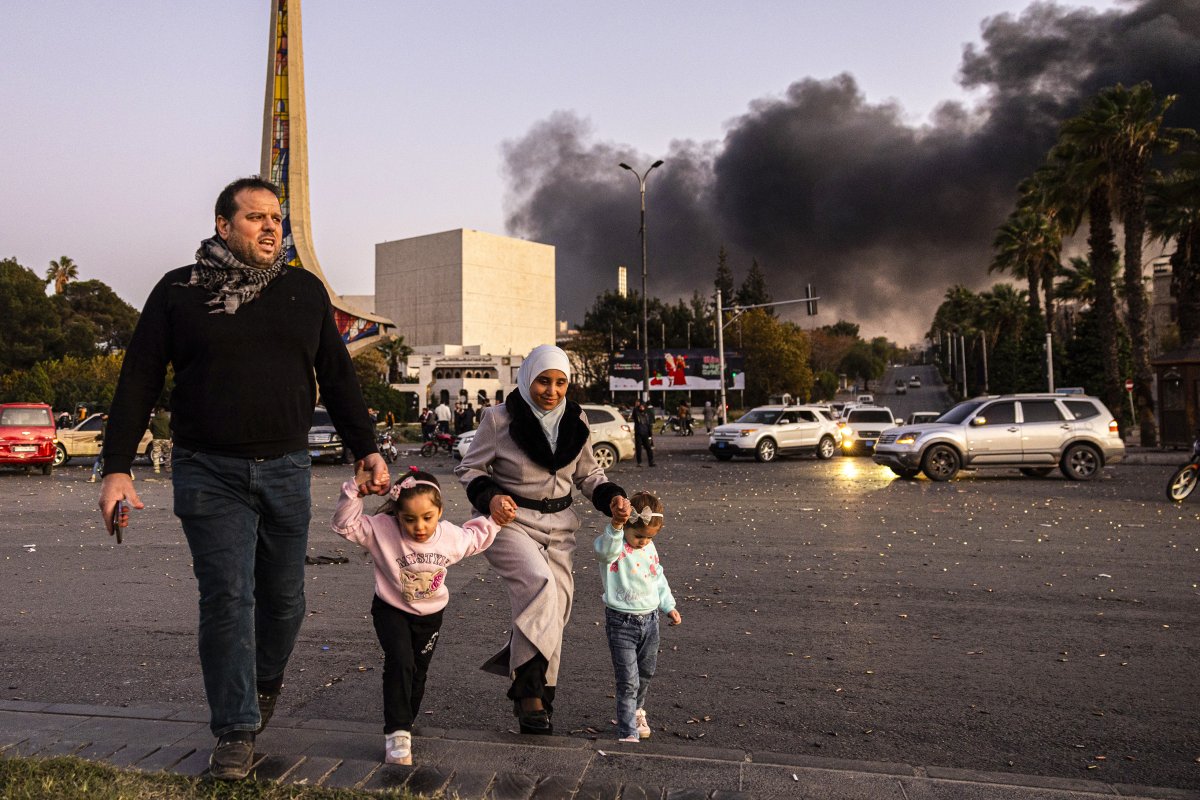
Smoke billows as people arrive to celebrate the fall of the Syrian government, in Damascus, Syria, Sunday, Dec. 8, 2024. Al-Jazeera news is reporting via X that a meeting to discuss transfer of power has…
Smoke billows as people arrive to celebrate the fall of the Syrian government, in Damascus, Syria, Sunday, Dec. 8, 2024. Al-Jazeera news is reporting via X that a meeting to discuss transfer of power has begun between Tahrir al-Sham leader al-Julani, Syrian Prime Minister al-Jalali, and Syrian Salvation Government head al-Bashir.
More
Ugur Yildirim/Dia/AP
06:51 AM EST
Hezbollah Issue Defiant Message
Via a post from his X account, Lebanon Hezbollah MP Fadlallah has suggested that the Iran-backed militant group will continue its efforts to oppose Israel despite the loss of support from the Assad regime “the resistance remains strong, despite the seriousness of the developments in Syria, it has no effect on the strength of the resistance.”
06:43 AM EST
Israel Strikes Suspected Chemical Weapons Sites
Israel’s foreign minister says it has struck suspected chemical weapons sites and long-range rockets in Syria in order to prevent them from falling into the hands of hostile actors.
“The only interest we have is the security of Israel and its citizens,” said Israel’s foreign minister Gideon Saar on Monday.
“That’s why we attacked strategic weapons systems, like, for example, remaining chemical weapons, or long-range missiles and rockets, in order that they will not fall in the hands of extremists.”
06:40 AM EST
Israeli Forces Enter Syria
In an unprecedented move, the Israeli Defense Forces (IDF) have entered Syrian territory for the first time in five decades, marking a significant escalation in regional tensions. This development comes on the heels of Syrian rebel groups toppling the regime of former leader Bashar al-Assad, who was overthrown after Damascus fell to opposition forces on Dec. 7.
Israeli troops advanced into the Golan Heights on Sunday, an area of southwestern Syria that has been a flashpoint of contention since the 1960s. The move underscores Israel’s strategic concerns in the wake of Assad’s collapse, as instability looms over its northern border.
In an official statement, the IDF clarified its position “In accordance with the situational assessment following the recent events in Syria, including the entry of armed personnel into the buffer zone, the IDF has deployed forces in the buffer zone and in several other places necessary for its defense, to ensure the safety of the communities of the Golan Heights and the citizens of Israel.”
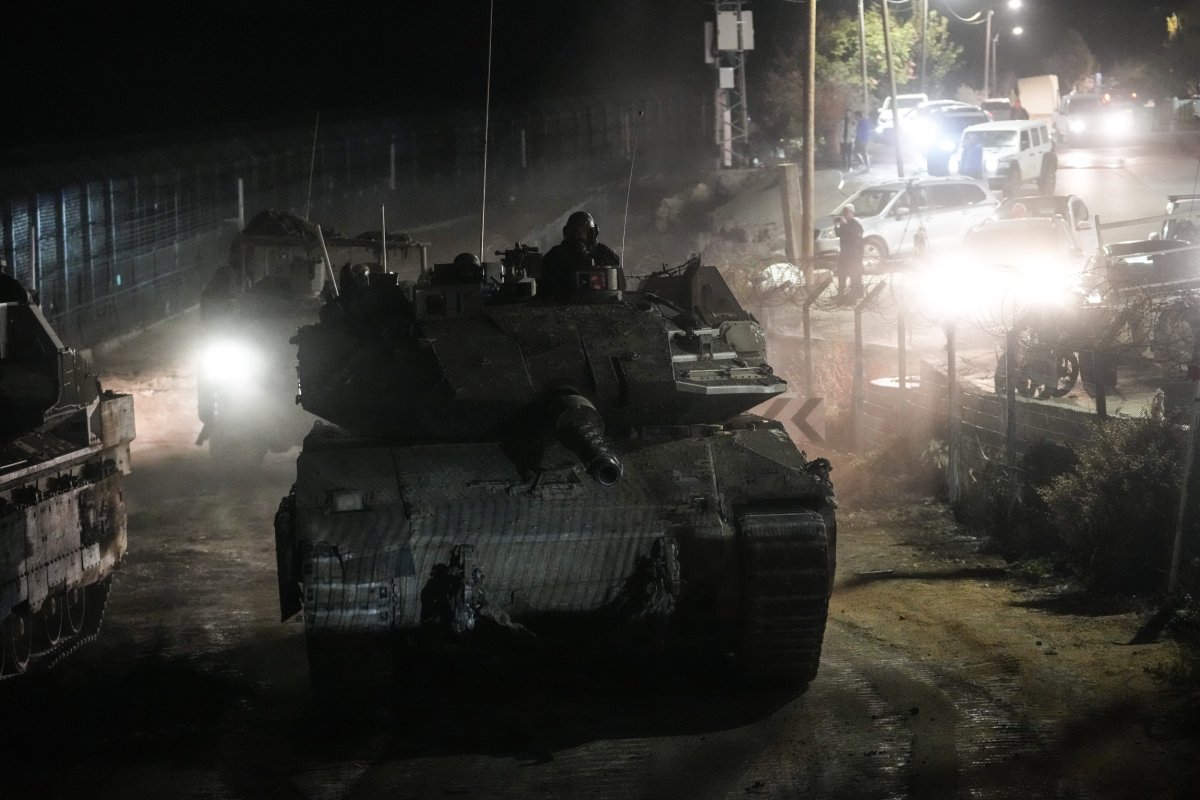
An Israeli army tank maneuvers near the so-called Alpha Line that separates the Israeli-annexed Golan Heights from Syria, in the town of Majdal Shams, Sunday, Dec. 8, 2024. In an unprecedented move, the Israeli Defense…
An Israeli army tank maneuvers near the so-called Alpha Line that separates the Israeli-annexed Golan Heights from Syria, in the town of Majdal Shams, Sunday, Dec. 8, 2024. In an unprecedented move, the Israeli Defense Forces (IDF) have entered Syrian territory for the first time in five decades, marking a significant escalation in regional tensions.
More
Matias Delacroix/AP
06:31 AM EST
Russian Forces ‘Encircled in Syria’
Russian military personnel are reportedly trapped in Syria, following the ousting of Bashar al-Assad.
The deposed Syrian president has fled to Russia, where he received asylum from his long-time ally, according to Russian media.
This followed advances across the country by rebels led by Islamist-group Hayat Tahrir al Sham (HTS), which seized control of the capital, Damascus, in a dramatic and sudden turn in the civil war that started in 2011.
Russia was either unable or unwilling to provide the military support to keep Assad in power in the way it did in 2016, when its intervention in Syria allowed it to protect its significant military assets, such as the naval base in the port city of Tartus.
06:28 AM EST
Syrian opposition forces have announced on Telegram their forces have moved swiftly to assert control and stabilize the country and provided security assurances to foreign diplomatic missions and Russian military bases still stationed in Syria.
This development comes as Czech Prime Minister Petr Fiala weighed in on Russia’s role in the conflict, remarking that its support for Assad “ultimately did not work out.” The Czech government, which has withdrawn its diplomatic staff from the Embassy in Damascus, has closely monitored the unfolding situation. Despite the upheaval, Interior Minister Vít Rakušan assured that the events in Syria pose no direct threat to the Czech Republic.
The Indonesian Foreign Ministry also offered reassurances regarding its citizens in Syria. It confirmed that all 1,162 Indonesians residing in the country remain safe amid reports of sporadic attacks following Assad’s fall.
Meanwhile, the opposition coalition has announced significant progress in securing the capital, Damascus, and re-establishing public order. The group’s leaders declared that their transition plan is nearly complete, with a new government prepared to take office immediately. This rapid response aims to mitigate fears of a potential power vacuum and restore confidence among Syrian citizens and the international community.
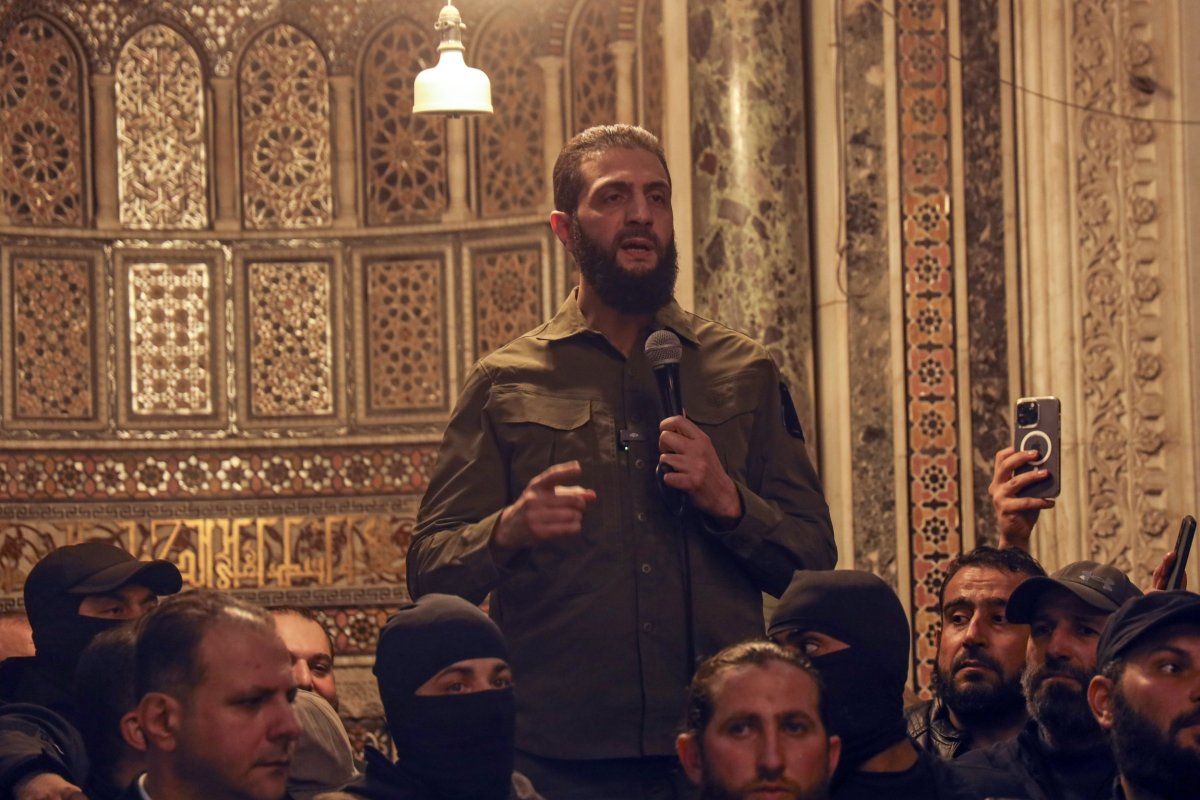
Abu Mohammed al-Golani speaks at the Umayyad Mosque in Damascus Sunday Dec. 8, 2024. Golani, a former al-Qaida commander who cut ties with the group and says he embraces pluralism and religious tolerance, leads the…
Abu Mohammed al-Golani speaks at the Umayyad Mosque in Damascus Sunday Dec. 8, 2024. Golani, a former al-Qaida commander who cut ties with the group and says he embraces pluralism and religious tolerance, leads the biggest rebel faction and is poised to chart the country’s future. He calls himself by his given name, Ahmad al-Sharaa, and not his nom de guerre. The group’s leaders declared that their transition plan is nearly complete, with a new government prepared to take office immediately.
More
Omar Albam/AP
06:06 AM EST
‘Human Slaugherhouse’ Prison Liberated
Following the overthrow of President Bashar al-Assad’s regime, thousands of detainees, including women and children, have been liberated from Syria’s notorious prisons. Among the facilities targeted was Saydnaya Prison, infamous for severe human rights abuses and described by Amnesty International as a “human slaughterhouse.”
After insurgents rapidly advanced across Syria in just over a week, bringing an end to the Assad family’s five-decade-long rule, emotional scenes unfolded as families reunited with loved ones who had been imprisoned on political charges.
Rebel forces have freed numerous prisoners from facilities formerly used for execution and torture, leading to widespread jubilation as former detainees reunite with their families, while crews continue to work across the country to ensure those still detained can be located and freed.
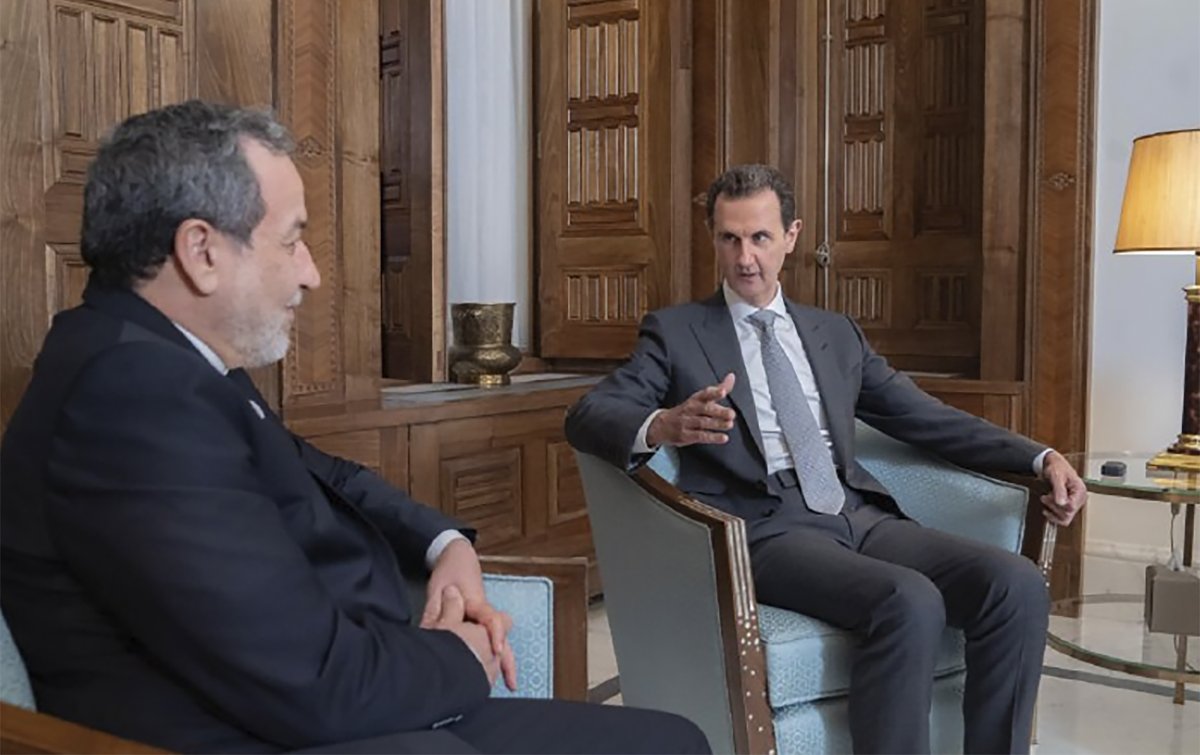
This photo released on the official Telegram page of the Syrian Presidency shows Iranian Foreign Minister Abbas Araghchi, left, and Syrian President Bashar Assad meeting in Damascus, Syria, Sunday, Dec. 1, 2024. Following the overthrow…
This photo released on the official Telegram page of the Syrian Presidency shows Iranian Foreign Minister Abbas Araghchi, left, and Syrian President Bashar Assad meeting in Damascus, Syria, Sunday, Dec. 1, 2024. Following the overthrow of President Bashar al-Assad’s regime, thousands of detainees, including women and children, have been liberated from Syria’s notorious prisons.
More
Syrian Presidency Telegram/AP
05:51 AM EST
Kremlin Confirms Putin Personally Granted Assad Asylum
Russian President Vladimir Putin personally decided to grant political asylum to former Syrian President Bashar al-Assad. Kremlin spokesman Dmitry Peskov confirmed the asylum but declined to disclose Assad’s current location, stating that President Putin has no plans to meet with him at this time. This development follows the recent overthrow of Assad’s government by Syrian rebels, leading to his departure from Syria.
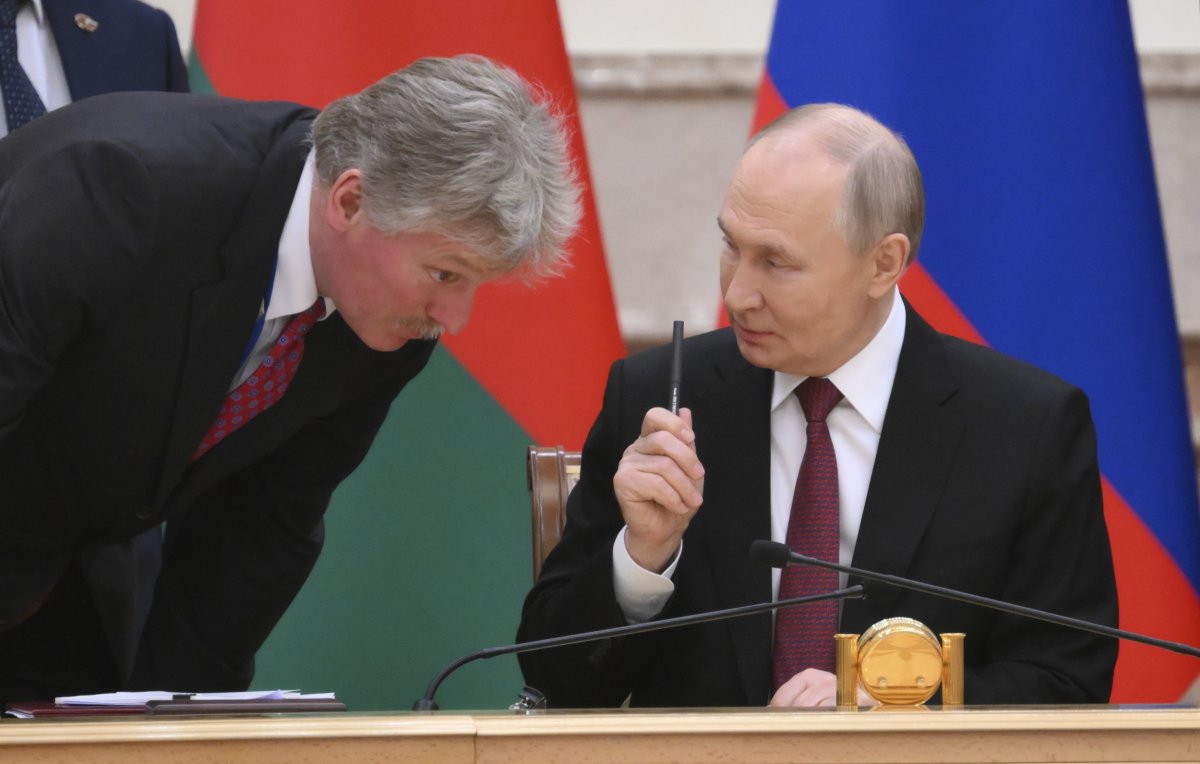
Kremlin spokesman Dmitry Peskov listens to Russian President Vladimir Putin before a signing ceremony following a meeting of the Supreme State Council of the Russia-Belarus Union State marking the 25th anniversary of the Union State…
Kremlin spokesman Dmitry Peskov listens to Russian President Vladimir Putin before a signing ceremony following a meeting of the Supreme State Council of the Russia-Belarus Union State marking the 25th anniversary of the Union State Treaty in Minsk, Belarus. Russian President Vladimir Putin personally decided to grant political asylum to former Syrian President Bashar al-Assad.
More
Grigory Sysoev / Sputnik via AP/AP
